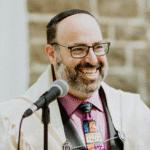
Dear Friends,
This week, in Parashat Yitro, Moses’ father-in-law gives him advice that changes the trajectory of our people: “The thing you are doing is not good… you cannot do it alone.” Yitro teaches us that holiness is not a solo endeavor. Whether receiving the Torah or building a community, we need shared burdens and shared joys.
We felt the weight of that shared burden this week with the bittersweet news of the return of (the last remaining Gaza hostage) Ran Gvilli’s remains to Israel. While our hearts break for his family, there is a complex comfort in knowing he is home. In our tradition, K’vurat HaMeit (burying the dead) is a Chesed Shel Emet—an ultimate kindness that can never be repaid. Bringing Ran home is a fulfillment of our collective responsibility, reminding us that no one in our family is forgotten.
This Sunday: World Wide Wrap 2026
Speaking of doing things together, I am calling on all adults, youth, our B’nei Mitzvah cohort, and our Converts Club to join us this Sunday, February 8, 8:30-10:15 am. We will gather for a morning of connection and prayer, featuring a KBI-original video presentation on t’filin assembly and use, help putting on your t’filin, and a special session on “The Kabbalah of T’filin” led by Reb Arie Chark, our resident Conservative Chassid! Following the learning, we will hold our morning minyan, take a group photo with our t’filin on, and enjoy a delicious breakfast celebration. Please register online so we can plan the food, and if you own t’filin, please bring them as our supply of loaners is limited. – REGISTER HERE
From Sinai to Shushan: A Purim Preview
Just as Yitro reminded Moses he needed help, I am reminded daily that the joy of Jewish life is built by you. Nowhere is that more palpable than our upcoming Purim celebrations, where we will fulfill the verse V’nahafoch Hu by turning sorrow into gladness.
The festivities begin early for our youth. On Sunday, March 1, our OTT school is hosting a KBI-wide Pre-Purim Carnival from 3:00-6:00 pm, where I will be presenting kid-friendly Megillah excerpts.
On Purim night itself, Monday, March 2nd, 7:00 pm, our teens (USY – grades 8-12) are invited to join “J.O.Y.” (Jewish Ottawa Youth) at Tailgators in the Merivale Mall for Megillah, fun food, unlimited pool and ping-pong, and bottomless soft drinks on tap. Register ($10) at bit.ly/joypurim26.
For the entire community, our Purim Evening Celebration takes place on Monday, March 2, at 6:30 pm. I am thrilled to introduce my first-ever original production, “A Whole New Spiel for KBI.” It features members, staff, and our choir, but the final scene is interactive and features you (no rehearsal required!). The evening will include a Red-Carpet Costume Parade, traditional Megillah reading by our fabulous volunteers, hors d’oeuvres to break the fast (all of the above are free for everyone), and a festive catered meal for those who register. REGISTER HERE
As we prepare, it is helpful to remember the four mitzvot that ground this holiday: Mikra Megillah (hearing the story), Mishloach Manot (sending food gifts to friends), Matanot LaEvyonim (giving charity to those in need), and Seudat Purim (the festive meal). These obligations ensure that our celebration is not just about fun, but about ensuring everyone in the community is cared for.
Whether you are coming for the beauty and whimsy of the Megillah, the laughter and music of the Spiel, or the Sunday Wrap, your presence makes us complete. As Yitro taught us, we cannot do it alone—but together, we can do anything.
Shabbat Shalom,
Cantor Jason Green